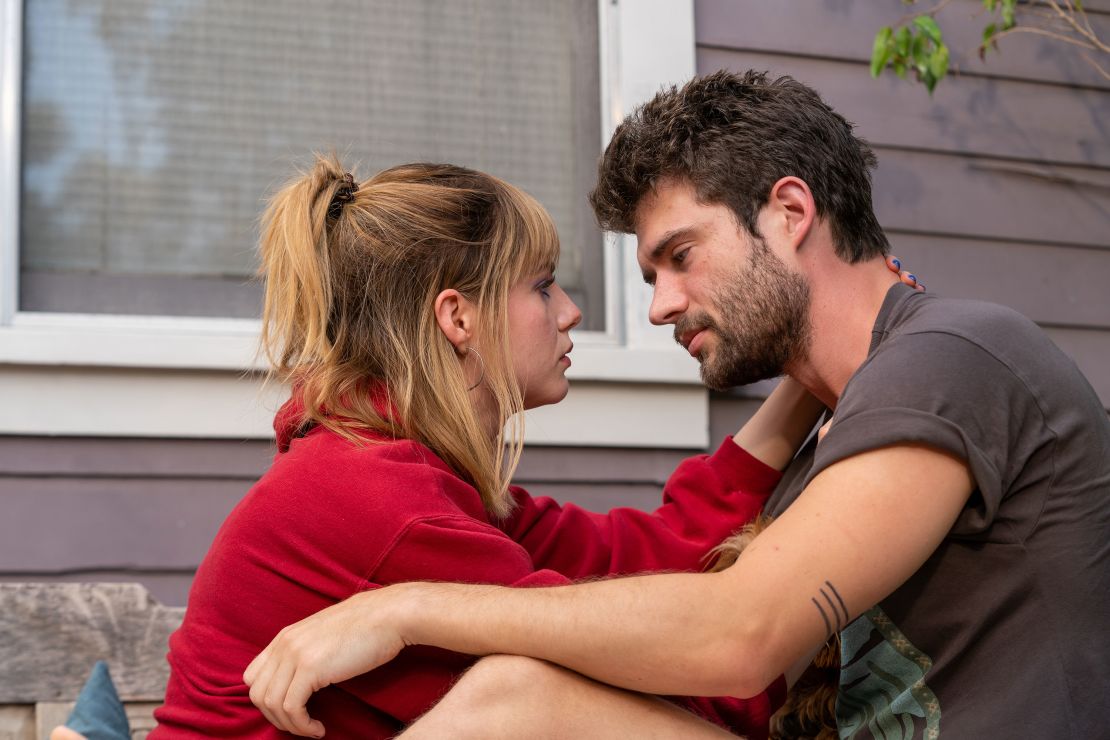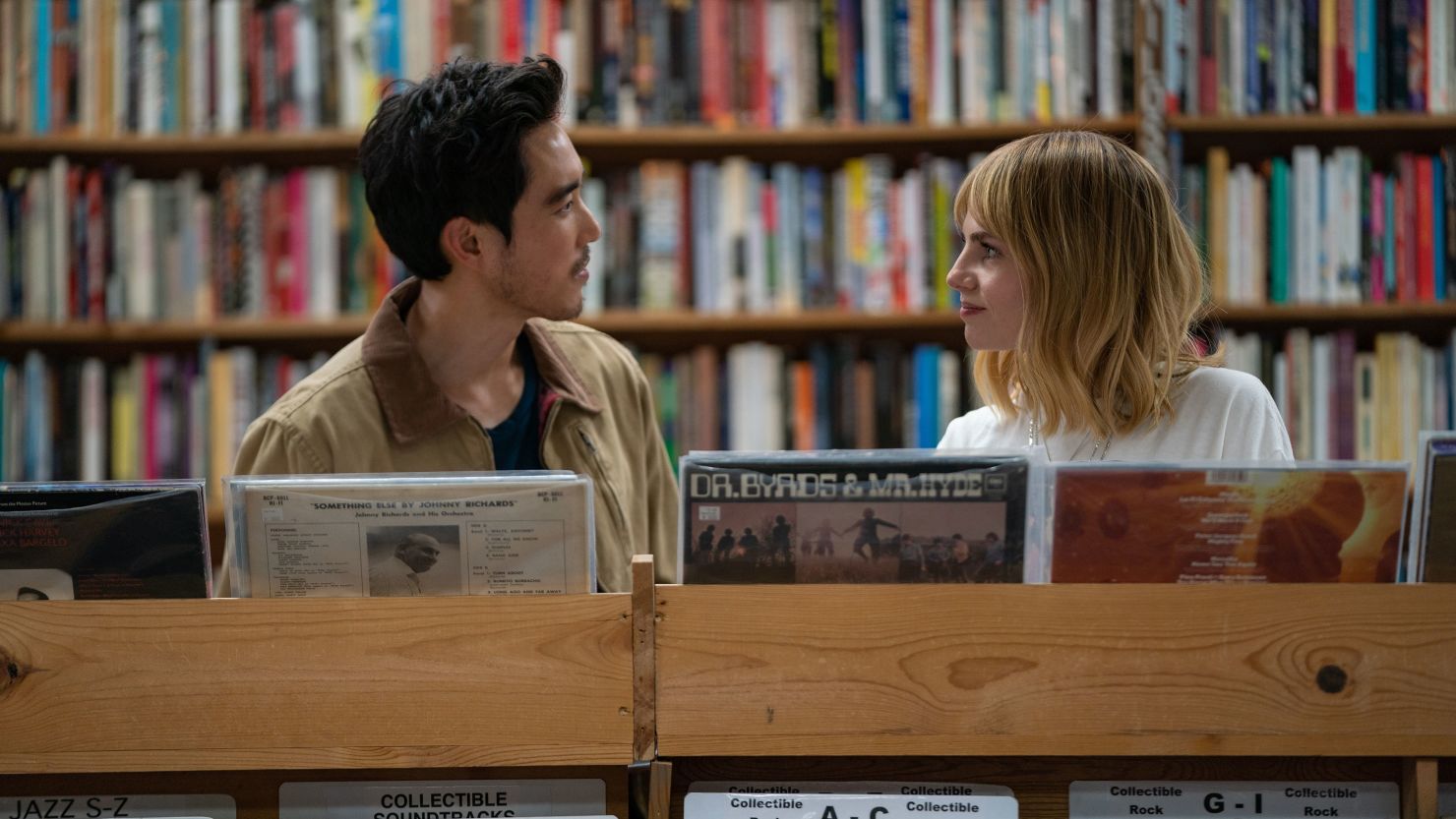Editor’s Note: Noah Berlatsky (@nberlat) is a freelance writer in Chicago. The views expressed here are his own. View more opinion on CNN.
Living in the past is cringe, and possibly worse than cringe. Sentimental longing will trap you in saccharine glop; it should be indulged only sporadically and with a self-deprecating shrug before you get back to the business of traipsing boldly and gloplessly into the future.

“Excuse the nostalgia,” David (Justin Min) tells Harriet (Lucy Boynton) in Ned Benson’s sort of romcom “The Greatest Hits.” The joke is that nostalgia, that treacly and embarrassing emotion, always requires an excuse — or might be inexcusable.
“The Greatest Hits” is about the dangers of drowning in nostalgia. Harriet’s boyfriend, Max (David Corenswet) died in a car crash two years before the start of the film, and she is trapped in the past — literally. Every time she hears a song she and her boyfriend heard together, she has a seizure and travels to the past, reliving and in some cases, altering key moments: their first meeting, a day at the beach, the day he died. Her condition sabotages her career as a music producer and she has to wear noise cancelling headphones at all times lest music and memory seize her unexpectedly.
But while the film presents nostalgia as distracting and even disabling, it also celebrates and sympathizes with Harriet’s attachment to an unrecoverable yesterday. The events of the past, and more our emotional connection to those events — love, grief, anger, sentiment — make us who we are. Without her nostalgia, Harriet isn’t quite Harriet; her identity, for better or for worse, is in large part based in her feeling for who she was and is. As uncomfortable and inconvenient as it may be, nostalgia defines us.

This isn’t exactly a new insight; on the contrary, it’s the theme of innumerable pop songs, which is in part why nostalgia is considered so cringe. Billy Joel’s indelible Boomer schmaltz exercise in his self-mythologizing “Piano Man,” as just one example, encourages you to submerge in Joel’s own all-encompassing nostalgia. He remembers being a struggling wannabe at a piano bar, yearning to attain the success and fame he has now attained — and of course he’s achieved that success and fame by sentimentally evoking his years of struggle. Similarly, Olivia Rodrigo’s “making the bed” mourns the lost authenticity of her life before stardom yearning for a past less famous self even as that past less famous self gives the song emotional resonance and heft.
This kind of sentimental past-evocation is sometimes criticized as cynical or in bad taste. It’s significantly less violent and dangerous, though, than the politicized, reactionary sentimental past-evocation deployed by right-wing movements. Former President Donald Trump’s slogan, “Make America Great Again”, encourages his followers to remember an idealized, throwback America — a throwback, earlier America, which, as many critics have pointed out, targeted Black people, LGBTQ people and women for even more discrimination than they experience today. “The Greatest Hits” doesn’t address the politicized power of nostalgia, but it’s obvious that the right often uses nostalgia for reactionary purposes, to create a positive emotional association with a flawed past and thereby undo progress towards equality.
Cringe nostalgia and toxic nostalgia can leave you without much nostalgia for nostalgia. But most of us, I think, have also experienced nostalgia in more positive contexts. Powerful experiences or relationships in the past — with a parent, a mentor, a significant other — become touchstones for who we are or who we want to be.
Dorothy Day, the Catholic social activist and anarchist, was inspired in large part by what we could call nostalgia for a particular time and place — the aftermath of the San Francisco earthquake in 1906, when she was eight years old. As Rebecca Solnit discusses in her book, “A Paradise Built in Hell: The Extraordinary Communities That Arise in Disaster,” Day was impressed and moved by the way that people rallied to help and take care following catastrophe. “What I remember most plainly about the earthquake was the human warmth and kindliness of everyone afterward,” she remembered later. “They stripped themselves to the bone in giving, forgetful of the morrow. While the crisis lasted, people loved each other.”
Day, like Trump, remembers an idealized past. But in her case, her nostalgic, sentimental attachment to that moment became an ongoing spur to love, charity and creating a more equal and generous world.

Earthquakes are obviously more dramatic, but pop music nostalgia can foster moral commitment as well. Following singer Sinéad O’Connor’s death, Annie Lennox performed a tearful tribute at the Grammys; she sang O’Connor’s most iconic hit, the Prince-penned, “Nothing Compares to U,” a song suffused with regret, longing and nostalgia. At the end of the performance, Lennox declared, “Artists for a ceasefire; peace in the world.”
As many noted, the controversial call for solidarity with Gaza and for peace was very much in line with O’Connor, who was both as a champion of unpopular causesand as a supporter of Palestinian rights. For Lennox, memory, sentiment and loss aren’t just an exercise in self-congratulation, as in “Piano Man.” Rather, the past become a moral imperative. To feel nostalgia for O’Connor requires solidarity in the present.
“The Greatest Hits” is aware that living in the past — or constantly revisiting the moment you heard Yellow Days’ “Gap in the Clouds” or had sex to binki’s “Heybb!”—can prevent you from living a full life in the present. It also, though, suggests that being the person you want to be now depends in large part on remembering who you’ve been, and on who you cared about in the past.
Harriet thinks her flashbacks literally allow her to travel into the past, where she can sometimes change what happened and alter the future. She hopes that she can use her time traveling abilities to prevent her boyfriend’s death. She wants to alter the timeline so that she is a less brokenly sentimental, less grief-stricken person. But her fierce commitment to undoing mistakes is inextricable from her sentiment and grief. Nostalgia holds her back; nostalgia pushes her forward. Human beings are made of feelings and the past squished together. That makes us cringe and horrible and ridiculous and sometimes also brave.



